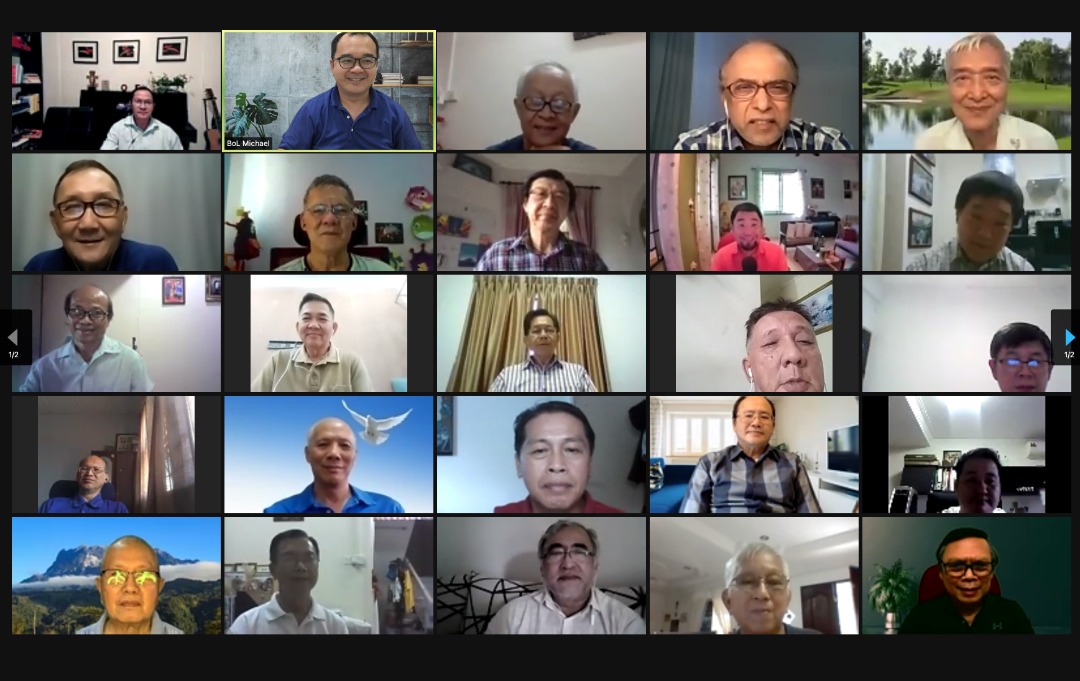FMCC urged to be new leaven in the post-pandemic communities of the parishes and dioceses
Kuching prelate, Archbishop Simon Poh, who presided over Mass for the elders and ordinary members of the Fellowship of Malaysian Covenant Communities
Sep 22, 2021

By Agnes Chai
Kuching prelate, Archbishop Simon Poh, who presided over Mass for the elders and ordinary members of the Fellowship of Malaysian Covenant Communities (FMCC), said in no uncertain terms that one of the current challenges for the covenant communities is whether members will return to the community gatherings and the praise and worship, etc, in the post-pandemic.
He likened it to the similar yet sober challenge faced by priests whether Catholics would return to Mass after the pandemic.
The FMCC, a joint initiative of the existing nine Covenant Communities in Malaysia to promote and foster fellowship and communion among the communities, were gathered for a virtual Eucharist, which was live streamed from the chapel of Kuching Archbishop Simon Poh Sep 16.
The nine communities take turn to host the fellowship gathering, which this time round fell to the Bread of Life Covenant Community based in Kuching.
The unprecedented 18-month pandemic has disrupted the annual general gathering, which was scheduled in 2020. The last such gathering was held in Labuan in 2018, which has since made a new provision to hold the gathering biennially instead of annually following the establishment of CHARIS in Malaysia.
However, the FMCC felt that priority should be given to gather the eldership to put into perspective the disarray of its lifestyle and mission and to test uncharted waters caused by the pandemic before assembling all members for a general fellowship, albeit online.
The Kuching prelate has put his fingers on one of the FMCC’s post-pandemic challenges. With great intuition, he stated with pastoral clarity in comparing his own journey as Archbishop in leading the Church during troubled times in the country.
Ruefully he said “I was an inexperienced shepherd who was called to face political giants,” referring to him being mobbed and insulted in the Kuching High Court over conversion ruling.
In referring to the COVID-19 catastrophe, he pointed out “My job description as bishop did not have a guidebook on this pandemic. Neither did many of the current bishops, priests, your covenant elders, and all of us.”
“But I am certain that when God calls and we respond in faith, he will equip us with the same Holy Spirit of Pentecost so that we can testify to him,” asserted the Archbishop as he recalled the numerous occasions that he was able to testify to God’s goodness since taking up the office of bishop.
Seizing the opportunity to remind the FMCC leaders and grassroot members alike, the prelate called to mind the four pillars (principles) that made up the foundation and model of the early church on which covenant communities were built: 1) Teaching of the Apostles, 2) Fellowship, 3) Breaking of Bread, and 4) Give to everyone in need.
Archbishop Simon described these four pillars as being reflected in the present context of the covenant communities as he knows them: 1) Word of God, 2) Community Life, 3) Mass/Eucharist, and 4) Ministry and Pastoral Services.
As far as to his shepherd’s knowledge, he was certain that the Sunday Eucharist is the reason that has united the Catholic Covenant Communities from breaking away, which unity has expressed the corporate Body of Christ. Though the pandemic has suspended services in church, praying at home and worshipping the Lord as a domestic church in solidarity with all Catholics is to be greatly encouraged.
Thanks be to God for the new technology (via Zoom, Google Meet, etc), a day does not go by without being able to access to e-sessions, listening to the Word of God, interceding, praying and worshipping the Lord using available apps. The Archbishop charged the elders the responsibility to feed the communities daily with God’s Word.
The community life is akin to family life, coming together for fellowships and sharing of meals. Though the pandemic has suspended these family pursuits, God intended the community to learn some lessons from the pandemic. During the several lockdowns, the communities have been able to experience a deeper communion and connection with God and with one another even without food or music to accompany.
Service and charity were a hallmark of the early church communities, which were duly reflected in covenant communities as they offer time, talent and treasures to their respective parishes, churches and dioceses. Despite COVID-19 having restricted physical services, but modern communication tools like internet and smartphones have allowed new creative ways to reach out to those who are suffering, struggling, and the lonely and isolated.
Archbishop Simon reiterated, a covenant community that has its foundation on the Eucharist, daily Word of God, community life and faithfully serves the church in various ministries in parish, will become a life-giving community, bearing testimonies of new conversions, like the early community, that will live on to inspire others.
He concluded with an invitation to both elders and members alike, to be the new leaven in the post-pandemic communities in their respective parishes and dioceses by calling them to 1) Go back to serve in the Sunday Eucharist and weekday Mass, 2) Thrive on the daily Word of God, 3) Re-commit to community meetings, and 4) Respond with new ways to mission and ministry.
He ended with a blessing and encouraging words of appreciation for the gift of covenant communities that have risen from the Catholic Charismatic Renewal to revitalize the Church.--CS







Total Comments:0